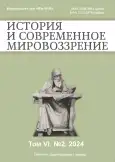Political Discord in Egypt’s Constitutional Transformation Process in 2012–2013
- Authors: Dombrovskiy P.A.1,2
-
Affiliations:
- Institute of Education, Tomsk State University
- Tomsk State University
- Issue: Vol 6, No 2 (2024)
- Pages: 126-135
- Section: DEBATING ISSUES OF GENERAL HISTORY AND INTERNATIONAL RELATIONS
- URL: https://bakhtiniada.ru/2658-4654/article/view/265999
- DOI: https://doi.org/10.33693/2658-4654-2024-6-2-126-135
- EDN: https://elibrary.ru/KBPJBV
- ID: 265999
Cite item
Abstract
The purpose of this study is to identify the factors of the political discord in Egyptian society that followed from the end of 2012 to the summer of 2013 in the context of the confrontation for power in the country in the 2011–2013s. by two players: the army leadership represented by the Supreme Council of the Armed Forces and the Muslim Brotherhood Islamist movement (an extremist organization banned in the Russian Federation) represented by the Freedom and Justice Party. According to the results of the analysis, it is recorded that the political discord in Egypt's society is formed in response to the activities of the Islamist government led by President Mohammed Morsi. The «project» of state transformation proposed and implemented (for a short time) by them was reactionary, as it was aimed at eliminating SCAF’s constitutional declarations designed in 2011–2012s. to limit powers of newly elected politicians. Their involving into the regulatory and legal field is regarded in this work as a key factor in the subsequent next round of the political crisis of the Arab Spring. To eliminate them, the M. Morsi’s government focuses on the formation of its own full-fledged constitution, designed to change the balance of power in political system. However, this is regarded by the politically active part of society as an attempt to usurp power and build an Islamic dictatorship in the end.
Full Text
##article.viewOnOriginalSite##About the authors
Pavel A. Dombrovskiy
Institute of Education, Tomsk State University; Tomsk State University
Author for correspondence.
Email: pavel_dombr97@mail.ru
ORCID iD: 0009-0006-8301-9330
SPIN-code: 1756-7419
Junior researcher, teacher, Postgraduate student
Russian Federation, Tomsk; TomskReferences
- Abdelrasul E. A. M. A. Revolutionary events in Egypt in 2011-2012s in the context of the Arab Spring: general and special / E. A. M. A. Abdelrasul. — Nizhny Novgorod, 2017. — 218 p.
- Akhmedov V. Army and politics in Egypt. Middle East and the modernity. — 2021. — Vol. 55. — Pp. 106–114.
- Anani K. The ‘Anguish’ of the Muslim Brotherhood in Egypt // Routledge Handbook of the Arab Spring: Rethinking Democratization
- Eisenstadt S. N. Multiple Modernities // Daedalus. — 2000. — Vol. 129. — No. 1. — Pp. 1–29.
- El Fadl K. A. Failure of a Revolution: The Military, Secular Intelligentsia and Religion in Egypt’s Pseudo-Secular State // Routledge Handbook of the Arab Spring: Rethinking Democratization / ed. L. Sadiki. — New-York: Routhledge, 2015. — Pp. 253–270.
- Grinin L. E., Korotaev A. V. Democracy and revolution // History and modernity. — 2013. — No. 2. — Pp. 15–35.
- Inglehart R. Modernization and Postmodernization // New post-industrial wave in the West: an anthology / V. L. Inozemtseva (ed.). — М.: Academia, 1999. — Pp. 261–291.
- Inglehart R., Welzel C. Modernization, cultural change and democracy: The sequence of human development. — М.: New Publishing House, 2011. — 464 p.
- Isaev L. M. Islamists and the political process in Egypt after the Arab Spring // «The Arab Crisis» and its international implications / A. M. Vasilev (ed.). — M. : LENAND, 2014. — Pp. 109–122.
- Isaev L. M., Korotaev A. V. Egyptian coup in 2013: experience in econometric analysis // Asia and Africa today. — 2014. — No. 2. — Pp. 14–20.
- Karpachova O. V. History of Islamic opposition in Egypt. — M. : URSS, 2013. — 216 p.
- Korotaev A. V., Shishkina A. R., Isaev L. M. Arab Spring as trigger for global phase transition? // Polis. Political Studies. — 2016. — No. 3. — Pp. 108–122.
- Korotaev A. V., Zin’kina IU. V. Egyptian Revolution in 2011: Structural and Demographic Analysis // Russia in the global world, 2000-2011: anthology in 6 volumes / Russian International Affairs Council. Vol. 4. — M.: Aspekt Press, 2012. — Pp. 175–187.
- Korotatev A. V., Isaev L. M. Anatomy of the Egyptian counterrevolution // World economy and international relations. — 2014. — No. 8. — Pp. 91–100.
- Moussa M. Contemporary Islamist Discourses on the State in Egypt: Before and After the Arab Spring. // Routledge Handbook of the Arab Spring: Rethinking Democratization / ed. L. Sadiki. — New-York: Routhledge, 2015. — Pp. 240–252.
- Primakov D. IA. Political and legal grounds for the failure of the 2011 revolution in Egypt // Vestnik of Saint Petersburg University. Law. — 2017. — Vol. 8. — No. 4. — Pp. 403–410.
- Razhbadinov M. Z. The anatomy of the Egyptian revolution — 2011: Egypt on the eve and after the political crisis in January-February 2011. — M.: Institut Vostokovedeniia RAN, 2013. — 424 p.
- Ryzhkov I. V., Borodina M. IU. Arab Spring as a quintessence of inter-Arab contradictions // Vestnik of Lobachevsky State University of Nizhni Novgorod. — 2012. — No. 6(1). — Pp. 252–256.
- Sapronova M. A. Electoral processes after the Arab Spring (modification of state institutions in Arab countries using the example of Algeria, Egypt, Libya, Morocco, Syria, Tunisia). — M.: Institute Blizhnego Vostoka, 2015. — 196 p.
- Truvtsev K. M. Arab Spring — process, actors, technology and subtotals // Politiia. — 2012. — No. 1(64). — Pp. 21–32.
Supplementary files








